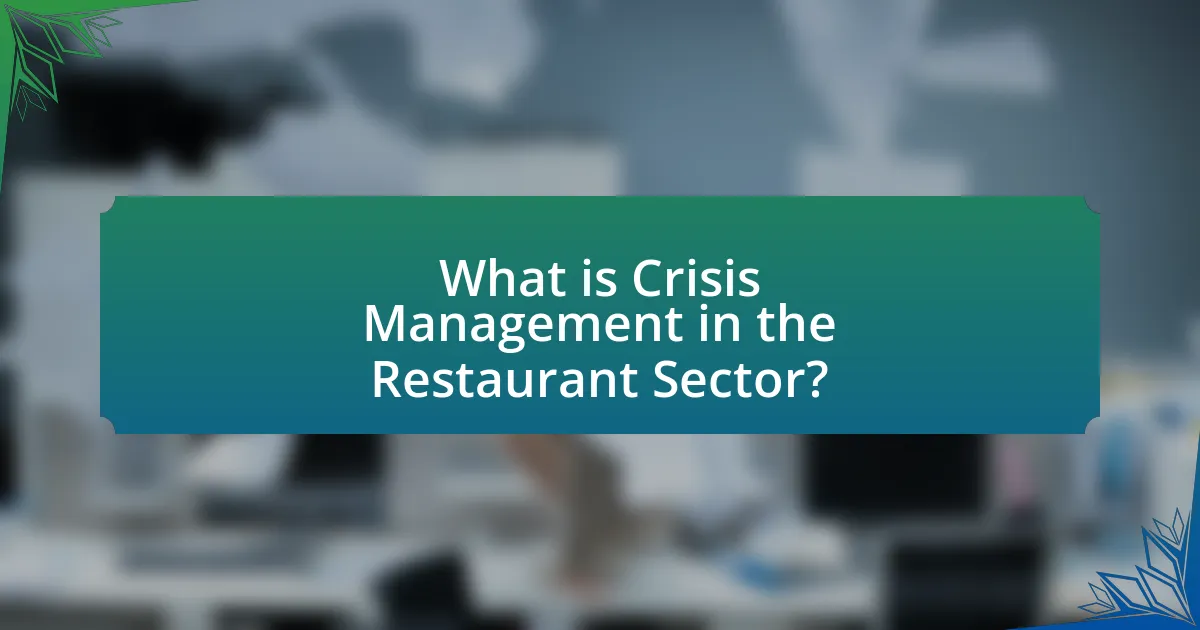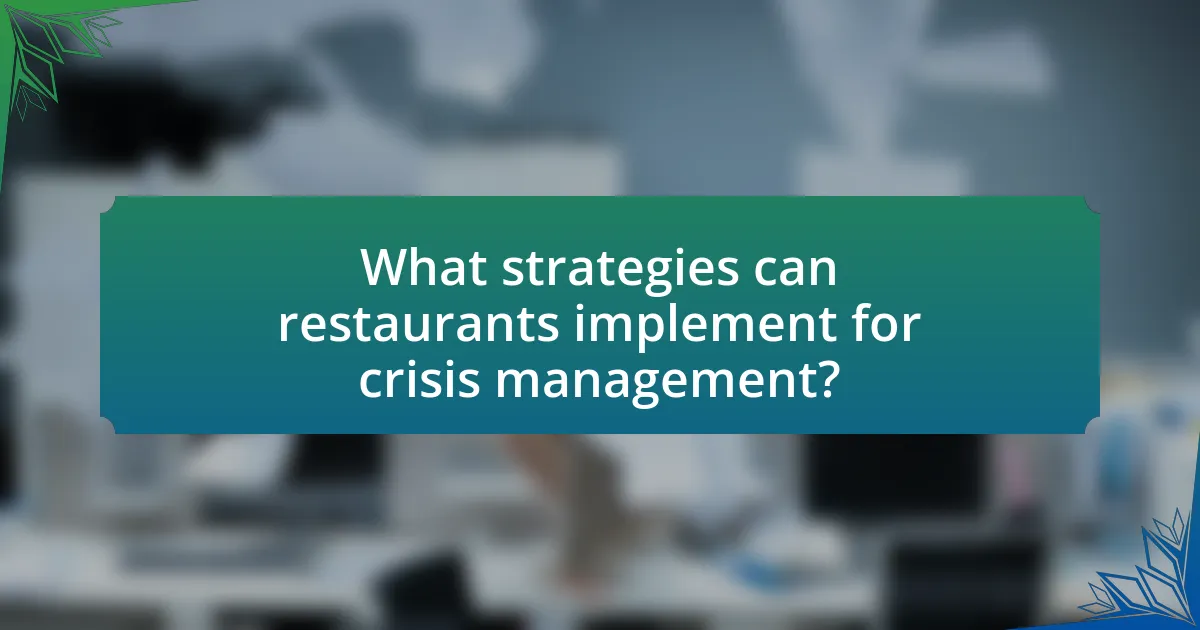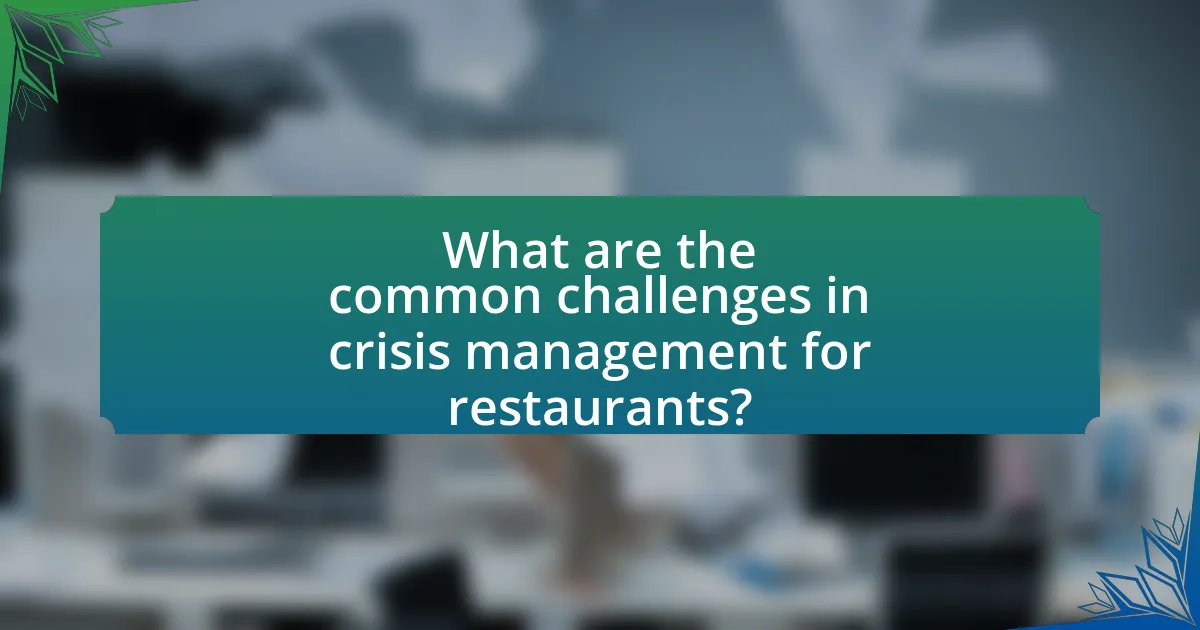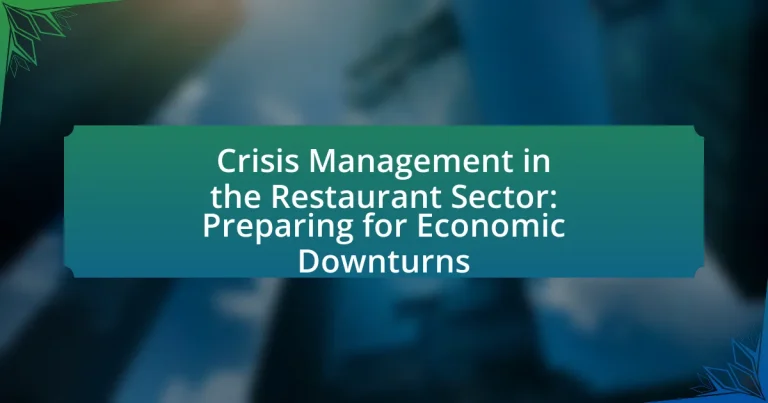Crisis management in the restaurant sector encompasses the strategies and actions that restaurant operators implement to prepare for, respond to, and recover from unexpected adverse events, such as food safety incidents, financial downturns, and natural disasters. The article outlines the importance of having a crisis management plan, effective communication, and operational flexibility to maintain customer trust and ensure business continuity. It discusses the key components of crisis management, including preparation, response strategies, and recovery plans, while emphasizing the necessity of ongoing staff training and the identification of potential crises through performance monitoring. Additionally, the article highlights the significant impacts of economic downturns on the restaurant industry and provides best practices for effective crisis management to enhance resilience and sustainability.

What is Crisis Management in the Restaurant Sector?
Crisis management in the restaurant sector refers to the strategies and actions taken by restaurant operators to prepare for, respond to, and recover from unexpected adverse events that can disrupt operations. This includes addressing issues such as food safety incidents, financial downturns, natural disasters, or public relations crises. Effective crisis management involves creating a crisis response plan, training staff, and implementing communication strategies to maintain customer trust and operational continuity. According to a study by the National Restaurant Association, 60% of restaurants that have a crisis management plan in place are better equipped to handle unexpected challenges, demonstrating the importance of proactive measures in safeguarding business resilience.
How does crisis management apply specifically to restaurants?
Crisis management in restaurants involves developing strategies to address unexpected challenges such as economic downturns, health crises, or natural disasters. Restaurants must implement contingency plans that include financial management, communication protocols, and operational adjustments to maintain service and protect staff and customers. For instance, during the COVID-19 pandemic, many restaurants adapted by enhancing takeout and delivery services, which helped mitigate revenue losses. According to a National Restaurant Association report, 75% of restaurants implemented new safety protocols to reassure customers and comply with health regulations, demonstrating the critical role of crisis management in sustaining operations during challenging times.
What are the key components of effective crisis management in restaurants?
The key components of effective crisis management in restaurants include preparation, communication, response strategies, and recovery plans. Preparation involves developing a crisis management plan that outlines potential risks and response protocols, ensuring staff are trained and aware of their roles during a crisis. Communication is crucial; it requires clear, timely information dissemination to employees, customers, and stakeholders to maintain trust and transparency. Response strategies should be adaptable, allowing restaurants to quickly address issues such as supply chain disruptions or health emergencies. Finally, recovery plans focus on restoring operations and assessing the impact of the crisis to improve future resilience. These components are essential for minimizing damage and ensuring business continuity during challenging times.
How do restaurants identify potential crises?
Restaurants identify potential crises through systematic monitoring of key performance indicators (KPIs), customer feedback, and market trends. By analyzing sales data, customer reviews, and social media sentiment, restaurants can detect early warning signs of declining performance or customer dissatisfaction. For instance, a significant drop in sales over a short period may indicate a crisis, prompting further investigation into possible causes such as menu changes or service issues. Additionally, external factors like economic downturns or changes in consumer behavior are assessed through market research and industry reports, allowing restaurants to anticipate challenges and adapt proactively. This approach is supported by studies showing that businesses that actively monitor these indicators are better equipped to respond to crises effectively.
Why is crisis management important for restaurants during economic downturns?
Crisis management is crucial for restaurants during economic downturns because it enables them to navigate financial challenges effectively and maintain operational stability. During such periods, restaurants often face reduced consumer spending, which can lead to decreased revenue. Implementing crisis management strategies allows restaurants to identify potential risks, adapt their business models, and optimize resources. For instance, a study by the National Restaurant Association found that restaurants that proactively engaged in crisis management were 30% more likely to survive economic downturns compared to those that did not. This underscores the importance of having a structured approach to address challenges, ensuring long-term sustainability and resilience in a volatile market.
What are the potential impacts of economic downturns on the restaurant sector?
Economic downturns significantly impact the restaurant sector by reducing consumer spending, leading to decreased sales and profitability. During economic recessions, consumers often prioritize essential purchases over dining out, resulting in a decline in restaurant patronage. For instance, during the 2008 financial crisis, the National Restaurant Association reported a 10% drop in restaurant sales, highlighting the sector’s vulnerability to economic fluctuations. Additionally, restaurants may face increased competition for a smaller customer base, prompting price wars and further squeezing profit margins. Consequently, many establishments may resort to cost-cutting measures, including layoffs and reduced hours, which can adversely affect service quality and employee morale.
How can effective crisis management mitigate these impacts?
Effective crisis management can mitigate the impacts of economic downturns in the restaurant sector by implementing strategic planning, communication, and resource allocation. By developing a comprehensive crisis management plan, restaurants can identify potential risks and establish protocols to address them, which reduces uncertainty and enhances operational resilience. For instance, during the COVID-19 pandemic, restaurants that quickly adapted their business models, such as shifting to takeout and delivery services, were able to maintain revenue streams and retain customer loyalty. Research from the National Restaurant Association indicates that businesses with proactive crisis management strategies are 30% more likely to survive economic challenges compared to those without such plans. This demonstrates that effective crisis management not only prepares restaurants for immediate challenges but also fosters long-term sustainability.

What strategies can restaurants implement for crisis management?
Restaurants can implement several strategies for crisis management, including developing a robust communication plan, diversifying revenue streams, and enhancing operational flexibility. A well-defined communication plan ensures that staff and customers receive timely updates during a crisis, which can help maintain trust and loyalty. Diversifying revenue streams, such as offering delivery services or meal kits, can mitigate financial losses during downturns. Enhancing operational flexibility allows restaurants to quickly adapt to changing circumstances, such as adjusting menus or staffing levels based on demand. These strategies are supported by industry data indicating that restaurants with diversified offerings and strong communication practices are more resilient during economic challenges.
How can restaurants prepare for economic downturns?
Restaurants can prepare for economic downturns by implementing cost-control measures and diversifying their revenue streams. Cost-control measures include optimizing labor costs, negotiating better terms with suppliers, and reducing waste through efficient inventory management. For instance, a study by the National Restaurant Association found that restaurants that actively manage food costs can improve their profit margins by up to 10%. Additionally, diversifying revenue streams, such as offering catering services or meal kits, can help stabilize income during economic fluctuations. Historical data shows that restaurants with multiple revenue sources are more resilient during downturns, as they can adapt to changing consumer behaviors and preferences.
What financial strategies should restaurants consider?
Restaurants should consider implementing cost control measures, diversifying revenue streams, and optimizing pricing strategies. Cost control measures, such as monitoring food waste and labor costs, can significantly enhance profitability; for instance, reducing food waste by just 10% can save a restaurant thousands annually. Diversifying revenue streams, such as offering catering services or meal kits, can provide additional income during economic downturns, as evidenced by many restaurants that successfully pivoted to takeout and delivery during the COVID-19 pandemic. Optimizing pricing strategies, including dynamic pricing based on demand and competitor analysis, can help maintain margins while attracting customers. These strategies collectively enable restaurants to navigate financial challenges effectively.
How can operational adjustments help during a crisis?
Operational adjustments can significantly enhance a restaurant’s resilience during a crisis by enabling swift adaptation to changing circumstances. For instance, implementing cost-cutting measures, such as reducing staff hours or renegotiating supplier contracts, can help maintain financial stability. According to a study by the National Restaurant Association, 70% of restaurants that made operational changes during the COVID-19 pandemic reported improved survival rates. Additionally, pivoting to takeout and delivery services allowed many establishments to continue generating revenue despite dining restrictions. These adjustments not only mitigate losses but also position restaurants to better meet customer needs in a rapidly evolving market.
What role does communication play in crisis management?
Communication is essential in crisis management as it facilitates timely information dissemination, stakeholder engagement, and decision-making. Effective communication ensures that all parties, including employees, customers, and suppliers, are informed about the crisis, the actions being taken, and any changes in operations. For instance, during the COVID-19 pandemic, restaurants that communicated clearly about safety measures and operational changes were able to maintain customer trust and loyalty, as evidenced by a survey from the National Restaurant Association, which found that 70% of consumers preferred establishments that communicated their health protocols. Thus, communication not only helps manage the immediate crisis but also plays a critical role in long-term recovery and reputation management.
How should restaurants communicate with staff during a crisis?
Restaurants should communicate with staff during a crisis through clear, consistent, and timely messaging. Effective communication involves utilizing multiple channels such as meetings, emails, and messaging apps to ensure all staff members receive the same information simultaneously. For instance, during the COVID-19 pandemic, many restaurants adopted daily briefings to update employees on safety protocols and operational changes, which helped maintain transparency and trust. Research indicates that organizations with strong internal communication during crises experience 50% less employee turnover, highlighting the importance of effective communication strategies in maintaining staff morale and retention.
What are best practices for communicating with customers during downturns?
Best practices for communicating with customers during downturns include transparency, empathy, and proactive engagement. Restaurants should clearly communicate any changes in operations, such as reduced hours or menu adjustments, to manage customer expectations effectively. Empathy in messaging helps customers feel understood; acknowledging their concerns about economic challenges fosters loyalty. Proactive engagement, such as reaching out through newsletters or social media, keeps customers informed and connected, which is crucial during uncertain times. Research indicates that businesses that maintain open lines of communication during crises can enhance customer trust and retention, as seen in studies by the Harvard Business Review, which highlight the importance of consistent messaging in maintaining customer relationships.

What are the common challenges in crisis management for restaurants?
Common challenges in crisis management for restaurants include supply chain disruptions, staff shortages, and maintaining customer trust. Supply chain disruptions can lead to ingredient shortages, affecting menu offerings and profitability. Staff shortages, often exacerbated by economic downturns, hinder operational efficiency and service quality. Maintaining customer trust is crucial, as negative experiences during a crisis can lead to long-term damage to a restaurant’s reputation. According to a survey by the National Restaurant Association, 75% of restaurant operators reported that staffing challenges significantly impacted their ability to manage crises effectively.
What obstacles do restaurants face when implementing crisis management strategies?
Restaurants face several obstacles when implementing crisis management strategies, including limited resources, lack of training, and inadequate communication. Limited resources hinder the ability to develop comprehensive plans, as many restaurants operate on tight budgets and may not allocate funds for crisis preparedness. Additionally, a lack of training among staff can lead to ineffective responses during crises, as employees may not know their roles or the procedures to follow. Inadequate communication, both internally among staff and externally with customers and suppliers, can exacerbate the situation, leading to confusion and misinformation. These factors collectively impede the successful implementation of crisis management strategies in the restaurant sector.
How can restaurants overcome resistance to change during a crisis?
Restaurants can overcome resistance to change during a crisis by fostering open communication and involving staff in the decision-making process. Engaging employees in discussions about necessary changes helps to alleviate fears and build trust, which is crucial during uncertain times. Research indicates that organizations that prioritize employee involvement experience higher levels of commitment and adaptability, as seen in studies conducted by the Harvard Business Review, which highlight the importance of inclusive leadership in crisis management. By actively listening to staff concerns and incorporating their feedback, restaurants can create a collaborative environment that encourages acceptance of new strategies and operational adjustments.
What are the risks of inadequate crisis management in the restaurant sector?
Inadequate crisis management in the restaurant sector poses significant risks, including financial losses, reputational damage, and operational disruptions. Financial losses can arise from decreased customer trust and reduced sales during crises, as evidenced by a study showing that restaurants with poor crisis responses saw a 30% drop in revenue during economic downturns. Reputational damage occurs when customers perceive a restaurant as unprepared or unresponsive, leading to negative reviews and loss of loyal patrons; for instance, a survey indicated that 70% of consumers would avoid a restaurant that mishandled a crisis. Operational disruptions can result from ineffective communication and resource allocation, which can hinder a restaurant’s ability to respond swiftly to challenges, ultimately affecting service quality and employee morale.
How can restaurants learn from past crises?
Restaurants can learn from past crises by analyzing their responses and outcomes to identify effective strategies and areas for improvement. For instance, during the COVID-19 pandemic, many restaurants adapted by enhancing their takeout and delivery services, which resulted in a 20% increase in off-premise sales for some establishments. By reviewing these adaptations, restaurants can develop contingency plans that include diversifying revenue streams and investing in technology for online ordering. Historical data shows that restaurants that implemented flexible business models during previous economic downturns, such as the 2008 recession, were more likely to survive and thrive post-crisis. This evidence underscores the importance of learning from past experiences to build resilience and ensure long-term sustainability.
What case studies illustrate successful crisis management in restaurants?
Successful crisis management in restaurants is illustrated by the case of Shake Shack during the COVID-19 pandemic. The company quickly pivoted to a robust takeout and delivery model, which allowed it to maintain revenue streams despite dining room closures. Additionally, Shake Shack implemented safety protocols that reassured customers, such as contactless payment and enhanced sanitation measures. This proactive approach resulted in a 20% increase in sales during the pandemic compared to the previous year, demonstrating effective crisis management strategies in a challenging economic environment. Another example is the response of Darden Restaurants, which owns Olive Garden and LongHorn Steakhouse. Darden adapted its operations by enhancing its digital ordering systems and expanding its delivery services, leading to a 30% increase in off-premise sales during the crisis. These case studies highlight the importance of agility and customer focus in successful crisis management within the restaurant sector.
How can lessons learned from past crises inform future strategies?
Lessons learned from past crises can significantly inform future strategies by providing actionable insights that enhance resilience and adaptability in the restaurant sector. For instance, during the COVID-19 pandemic, many restaurants adopted digital ordering and delivery services to maintain revenue streams, demonstrating the importance of technological integration in crisis response. Additionally, data from the National Restaurant Association indicates that restaurants that diversified their offerings and implemented flexible business models were more likely to survive economic downturns. By analyzing these historical responses, restaurant operators can develop proactive strategies that prioritize innovation, customer engagement, and operational flexibility, ultimately leading to improved crisis preparedness and sustainability.
What are the best practices for effective crisis management in restaurants?
Effective crisis management in restaurants involves proactive planning, clear communication, and swift action. Restaurants should develop a comprehensive crisis management plan that includes risk assessment, employee training, and emergency protocols. For instance, a study by the National Restaurant Association highlights that restaurants with a crisis management plan are 30% more likely to recover quickly from adverse events. Additionally, maintaining open lines of communication with staff and customers during a crisis fosters trust and transparency, which is crucial for reputation management. Regularly reviewing and updating the crisis management plan ensures that restaurants remain prepared for evolving challenges, thereby enhancing resilience in the face of economic downturns.
How can restaurants develop a crisis management plan?
Restaurants can develop a crisis management plan by conducting a thorough risk assessment to identify potential crises, such as economic downturns, health emergencies, or natural disasters. This assessment should include evaluating vulnerabilities in operations, supply chains, and customer interactions. Following the assessment, restaurants should establish clear protocols for communication, decision-making, and resource allocation during a crisis.
Additionally, training staff on these protocols ensures preparedness and effective response. Regularly reviewing and updating the plan based on new risks or past experiences enhances its effectiveness. According to a study by the National Restaurant Association, 60% of restaurants that implemented a crisis management plan reported improved resilience during economic challenges.
What ongoing training and preparation are necessary for staff?
Ongoing training and preparation necessary for staff in the restaurant sector during economic downturns include crisis management training, financial literacy education, and customer service enhancement programs. Crisis management training equips staff with skills to handle emergencies and unexpected situations effectively, ensuring operational continuity. Financial literacy education helps staff understand cost control, budgeting, and resource allocation, which are crucial during economic challenges. Customer service enhancement programs focus on maintaining high service standards to retain customers, even when resources are limited. These training initiatives are essential for fostering resilience and adaptability among staff, ultimately contributing to the restaurant’s survival and success during downturns.




